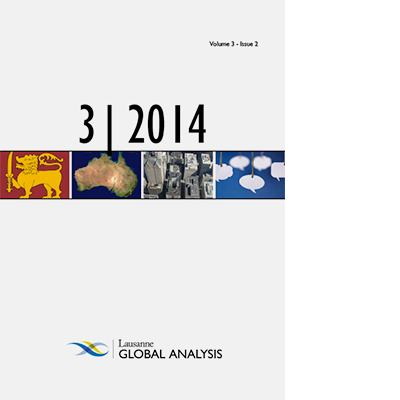Welcome to the March issue of Lausanne Global Analysis.
Whether you are planning to read the full articles or just the executive summaries, we hope that you find this issue stimulating and useful. Our aim is to deliver strategic and credible analysis, information, and insight so that as a leader you will be better equipped for the task of world evangelization. It’s our desire that the analysis of current and future trends and developments will help you and your team make better decisions about the stewardship of all that God has entrusted to your care.
In this issue we address the challenges facing the church in Sri Lanka and the lessons we can learn from it; ecomissiology and ecojustice as Christian responses to climate change, especially in Oceania; a strategic approach to placing cities at the heart of mission; the impact of the orality movement on global ministry and the benefits it can bring; and, in one of our shorter pieces, helping to process trauma and resolve conflict in the crisis in South Sudan.
‘Christianity in Sri Lanka today is simultaneously vigorous, fragile, and persecuted’, writes Kamal Weerakoon. The social effects of a long civil war make Christian living difficult. Buddhist nationalism dubs evangelism as colonialism and conversion as treason. New non-denominational churches are vulnerable to mismanagement, personality cults, and false teaching. Established denominational churches struggle with the legacy of theological liberalism and complacency. However, committed leadership and inter-denominational cooperation are forging a path for the future. ‘Many of the issues facing churches in Sri Lanka arise in slightly different forms in other countries. There are thus lessons to be learned’, he concludes.
‘Climate change is having a real impact upon communities in the South Pacific (Oceania) through sea level rise and extreme sea level events, threatening forced migration, and profound cultural impacts’, writes Mick Pope. A Western ecomissiology should focus on ecojustice, both in terms of adaptation in caring for those impacted and of mitigation via speaking ecoprophetically to Western power structures. Indigenous ecotheologies like Theomoana will help contextualise ecotheology as cultures adjust to life in a changing world. ‘While many of these points appear to move from a traditional missional focus of proclaiming the gospel, they in fact take seriously the Kingdom of God in its emphasis on peace, justice, and reconciliation of all things’, he concludes.
‘It is vital to examine the evidence of urban growth and its implications for Christian mission’, writes Paul Hildreth. Among some global mission agencies a rural paradigm of mission still predominates, even though by around 2008, over half the world’s population was urban. Yet if the focus of mission simply shifts from the rural across to global cities, something critical is being missed: more than 53% of the world’s urban population lives in smaller cities of fewer than 500,000 inhabitants. To really understand the urban context, it is vital to travel beyond capital cities. ‘If the roles and relationships of different types of churches were mapped within the city and churches developed a better understanding of how these roles might be complemented to support each other across the city, a more strategic approach towards mission for the city might become possible’, he concludes.
‘Over the last 30 years, Chronological Bible Teaching (CBT) has gone global, and from rural tribal settings to the urban centers of the world, reintroducing the missions world to the powerful use of story in ministry’, writes Tom Steffen. However, many church leaders today remain unaware of the movement. The modern orality movement impacts global ministry on every level, whether one is aware of it or not. It influences every aspect of ministry: training, theological education, Bible curricula, Bible translation, evangelism, church planting, community development, business as mission, creation care, the arts, media, hermeneutics, and homiletics. Let us hope that global church leaders discover its contributions. ‘The present orality movement can provide many answers for global ministries if we can shed our silos’, he concludes.
The recent violence in South Sudan has raised fears that the world’s newest nation may be on the brink of state collapse. However, ‘to concentrate only on the political figures ignores a much larger issue’, writes Paul Park. They are trying to steward a country of traumatized people whose psychological and emotional wounds have not healed from generations of war and oppression. To leave the trauma of these experiences unaddressed is to invite a perpetual repeat of this cycle of violence and to undermine any progress on good governance and economic development. It is important, he concludes, ‘to seek out partner organizations that understand the importance of – and integrate into their activities – the processing of trauma, resolving of conflict, building of peace, and ultimately nation-building, even while providing clean water, discipleship, agricultural development, church planting, etc.’
Please send any questions and comments about this issue to analysis@lausanne.org. The next issue of Lausanne Global Analysis will be released in May.

